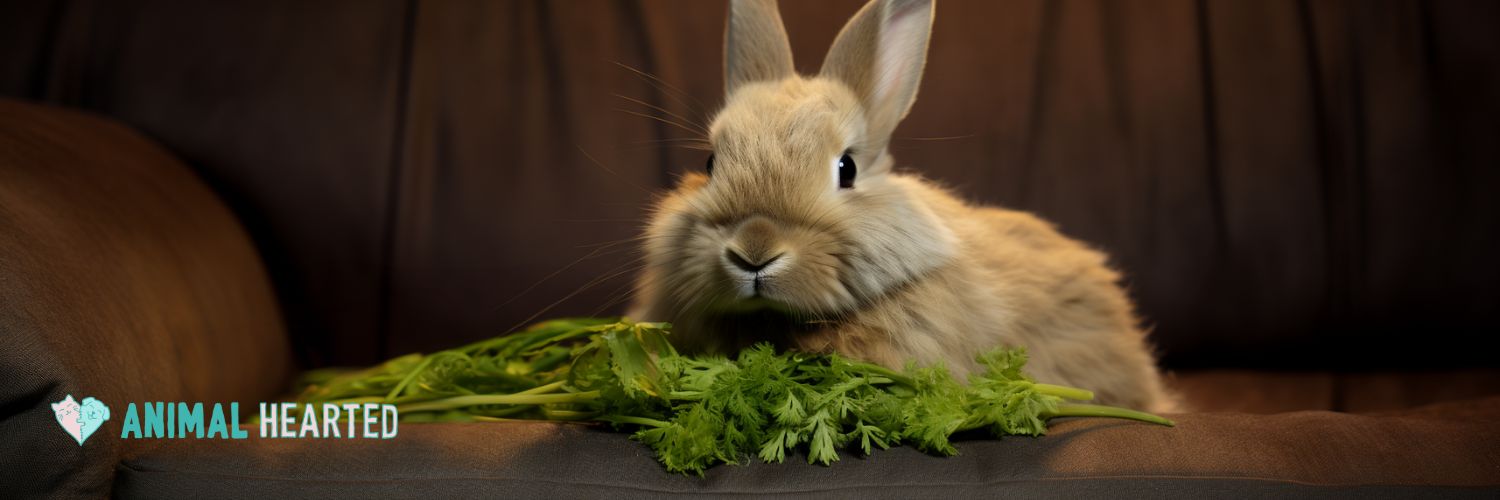shelter pets in need
Each order helps pets in need

Rabbits are great pets that have delicate digestive systems, so it's natural to wonder if certain herbs, like parsley, are safe for them to eat. Good news: not only is parsley safe for your bunny, it's also a beneficial addition to their diet. Packed with essential vitamins and minerals, this leafy green can provide your furry friend with a nutritional boost.
However, it's important to introduce parsley to your rabbit's diet gradually. Starting with small amounts will help prevent any potential digestive upset. And although parsley is healthy, it should be given as part of a balanced diet, which is primarily made up of hay, with vegetables as a supplement.
When planning your bunny's meals, it's crucial to understand the balance of vitamins, minerals, and other nutrients they require. A proper diet ensures a healthy digestive system and overall well-being for your furry friend.
Your rabbit's diet should be rich in fiber, primarily provided by hay, which is crucial for their digestive health. A balance of vitamins like Vitamin A for vision and Vitamin K for bone health is essential, as well as minerals such as calcium for strong teeth and bones.
Vegetables play a vital role in a rabbit’s diet, with leafy greens being an excellent choice. They provide essential nutrients and variety, which are key to preventing boredom with their food. Remember, introduce new vegetables like parsley gradually to avoid digestive issues.

Rabbits have a unique digestive system that requires a diet low in fat and carbohydrates but high in fiber. Proper digestion is critical to avoid problems like bloating, gas, and diarrhea, so always monitor how your rabbit reacts to new foods.
Aim for a balanced diet for your bunny that consists mainly of hay, complemented by a selection of safe vegetables and a small portion of pellets. Hay should be the bulk of their diet, with a variety of greens added for additional nutrients. The occasional fruit, like oranges, can be a treat, but only in moderation.
Always ensure the greens and vegetables you offer are safe and free of pesticides—organic is best. If your rabbit shows any sign of an adverse reaction to a new food, consult with your veterinarian immediately. Change their diet slowly to avoid shocking their system and causing digestive upset.
When considering fresh greens for your bunny's diet, parsley is a standout choice for its nutritional benefits, but it's important to understand the balance needed to maximize those benefits while minimizing potential risks.
Parsley is a vibrant herb packed with vital nutrients that are beneficial for your rabbit. Rich in vitamins A, C, and K, it also provides calcium, iron, and an array of antioxidants which can contribute positively to your pet's health. Its high dietary fiber content is crucial for your rabbit's digestion.
Including parsley in your bunny's diet can boost their immune system and keep their digestion running smoothly. The anti-inflammatory properties of the antioxidants in parsley also help in safeguarding your pet’s health. Moreover, parsley's potassium and magnesium content contribute to a well-rounded diet.
Despite its benefits, parsley contains calcium and oxalates, such as oxalic acid, which can lead to kidney or bladder stones if consumed in large quantities. It's important to feed parsley in moderation to prevent any digestive problems that can occur from too much calcium or oxalate in a rabbit's diet.
Incorporating parsley into your bunny's diet can deliver essential nutrients, but it's all about striking the right balance. Keep in mind that while parsley is safe and nutritious, moderation is key to maintaining a healthy diet for your rabbit.
The appropriate serving size of parsley for your rabbit typically ranges from 1-2 sprigs per day, depending on their body weight. Overfeeding can lead to digestive and health issues, so it's important to weigh out parsley as a part of a balanced diet that includes a variety of vegetables.
When preparing parsley, always ensure it's washed thoroughly to remove any pesticides or contaminants. Fresh parsley is preferable over dried, as it retains more nutrients. You can offer both the leaves and stems, but avoid giving them the roots which are not typically part of a rabbit's diet.
When introducing any new foods such as parsley, start with a small amount to observe how your rabbit's digestive system reacts. If no adverse effects are noticeable, you can gradually increase the amount within the recommended serving size.
Beyond parsley, a rabbit's diet can benefit from a variety of other leafy greens like kale, romaine lettuce, basil, and arugula. Vegetables like broccoli, zucchini, radishes, cauliflower, and celery can also be safe and healthy options when fed in moderation, alongside occasional fruits as treats.
Thinking of upgrading your furry friend's home? Here is a list of the best rabbit hutches to choose from!
When you add parsley to your bunny's diet, it's vital to monitor their health and know when to seek veterinary care. Parsley can offer health benefits but also poses risks if not managed properly.
Be on the lookout for signs of digestive problems like bloating, gas, or diarrhea after your bunny eats parsley. These symptoms can indicate an adverse reaction, particularly if the herb is introduced quickly or fed in large amounts.
Parsley contains compounds that can lead to the formation of kidney stones or bladder stones, so observe your pet's urine output and overall behavior.
If you spot any signs of adverse reactions—such as bloating, noticeable discomfort, changes in eating habits, or irregular bowel movements—contact your veterinarian immediately.
Vets can provide guidance tailored to your bunny's specific condition and help manage any dietary-induced health issues. Remember, timely intervention can prevent complications like digestive problems from escalating, safeguarding your pet's well-being.
READ NEXT: Can Rabbits Use Cat Litter? Understanding the Risks and Safe Alternatives
Leave a comment